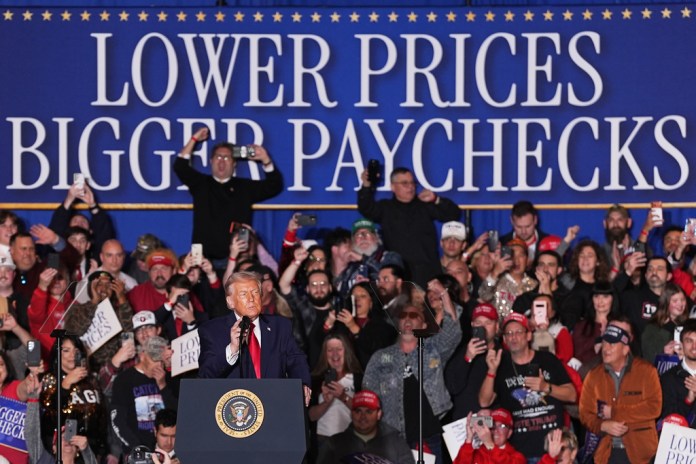Trudeau Leaves A Legacy Of Failure And Electoral Discontent
Canadian Prime Minister Justin Trudeau announced his resignation on Monday amid a backdrop of declining popularity and discontent within his own party. Speaking on his departure,Trudeau characterized himself as a “fighter” but acknowledged that he was effectively pushed out by his caucus.His decision comes as his Liberal Party faces a substantial deficit in public support, trailing behind the conservative Party led by Pierre Poilievre by 25 points in most polls.
In his speech, Trudeau criticized Poilievre’s vision for Canada, which he claimed was not aligned with the needs of Canadians, particularly in terms of climate change and diversity. Trudeau, once a rising star in progressive politics as taking office in 2015, now leaves as a polarizing figure, with his administration criticized for its handling of rising living costs, crime, and high immigration rates, which many Canadians feel have exacerbated these issues.
As Trudeau formally suspended Parliament until the Liberal Party selects a new leader, he will not face an immediate election, allowing the party time to regroup. This political drama unfolds amid concerns over the incoming Trump administration in the U.S., which poses potential economic threats to Canada.
trudeau, who initially energized the Liberal Party, is now confronted with growing dissatisfaction. Younger Canadians, who once supported him, are increasingly shifting towards Conservative sentiments, influenced by issues like the cost of living and housing affordability over traditional progressive topics. His previous accomplishments, including notable social reforms, are overshadowed by the criticism he faces today related to pandemic policies and his perceived disconnect with the public’s pressing concerns.
Facing the bitter cold, along with an angry country, Canadian Prime Minister Justin Trudeau announced his resignation Monday, saying he stayed in the job amid plunging popularity because he was a “fighter.” In his typical self-absorbed style, the prime minister thanked no one but acknowledged in so many words that he was pushed out by his own caucus.
When asked by a reporter if another leader might be better able to confront opposition leader Pierre Poilievre — whose Conservative Party leads Trudeau’s Liberal Party by 25 points in most polls — in the next election, the prime minister pontificated on the progressive politics that made him famous and that he pushed for nine years in office. He also alluded to what he saw as the dangers of the incoming Trump administration.
“Pierre Poilievre’s vision for this country is not the right one for Canadians,” Trudeau said, taking his rival to task for wanting to “(stop) the fight against climate change,” not focusing on “diversity,” and “attacking journalists” and the Canadian Broadcasting Corporation (CBC).
A former drama teacher and ski instructor, Trudeau swept to office as a progressive poster child in 2015, campaigning on “sunny ways” and doing things better. He leaves office a deeply unpopular and divisive figure — with progressive politics on the wane around the world — as Canadians seethe over the high cost of living, crime and disorder, the fallout of high immigration levels, and the cost of his climate policies. His resignation speech encapsulated the sense that he’s out of touch, too, obsessing over issues such as guns and abortion, longtime wedge issues in Canadian politics, rather than pocketbook issues as the Canadian population becomes progressively poorer in comparison to their American neighbors.
Trudeau officially prorogued (suspended) Parliament until the Liberal Party picks a new leader, meaning no election is expected until the spring at the earliest. The break ostensibly gives the governing party an opportunity to regroup, though critics pointed out that the pause allows some lawmakers — including Jagmeet Singh, leader of the left-wing New Democratic Party, which has propped up the Liberals since 2021 — to pass the service threshold for collecting their pensions.
All of the drama plays out amid Canadian angst over the incoming Trump administration, which has threatened tariffs of 25 percent on Canada and Mexico if drugs and migrants don’t stop crossing the border. Trump has turned much of his attention toward Canada, while largely sparing Mexico, jesting in social media posts that Canada could become the 51st state and referring to Trudeau as “governor.” But the worry is palpable in Canada: Tariffs could cost 2.4 million jobs and sink the country into recession, according to economist Trevor Tombe at the University of Calgary.
For his part, Trump greeted Trudeau’s resignation with more talk of a merger. Others, such as Rep. Marjorie Taylor Greene, said Trump “liberated” Canada. Such talk chafed many Canadian commentators, who emphasized deep dissatisfaction with Trudeau dating to before Trump’s election, though one prominent commentator observed a connection.
“I see a straight line from Trump’s Truth Social outburst of Nov. 25 to this week’s events,” longtime political columnist Paul Wells wrote on Substack. “Trudeau’s circle once thought a second Trump victory would help them make the case against Pierre Poilievre … With Elon Musk continuing his hobby kibbitzing in the politics of countries around the world, Canada will now stand as a warning to governments elsewhere: Trump and his crew can take you down.”
Trudeau wasn’t always seen as such a liability. He took a moribund Liberal Party from third-place standing to a majority government in the 2015 election. He pulled in young voters, drawn by his celebrity and promises of electoral reform (an issue he abandoned after he took office), embraced progressive causes, and signaled a fresh approach to politics, summed up by his response to a question on appointing a sex-balanced cabinet: “Because it’s 2015.”
Those same Millennials are turning Conservative in 2024. A November survey from Abacus Data showed 38 percent of Canadians aged 30 to 44 plan to vote Conservative, while 34 percent of Gen Z voters said they would do the same, according to The Globe and Mail. Both cohorts prioritized the cost of living and housing affordability over climate change and the environment. They also expressed less openness to immigration than older voters. “The short-term scarcity of not being able to afford a home, about feeling insecure about where the economy is going and how fast it’s changing, has taken precedence,” David Coletto, Abacus Data’s CEO, told The Globe.
Trudeau’s early accomplishments in office included decriminalizing marijuana and pushing a child tax credit and a $10-a-day daycare program. Canadians largely credit him with effectively handling the first Trump administration, achieving continued access to the U.S. market through the USMCA trade deal. He largely led a good-times government, though. He marched in pride parades, pushed a carbon tax to fight climate change, and spoke of indigenous reconciliation.
In all of this, Trudeau often acted like a blue-state governor. He vociferously opined on U.S. events such as the Supreme Court decision on Roe v. Wade and school shootings, while embracing the Black Lives Matter protests. He drew endorsements from Democrats, including President Obama (with whom he formed a “bromance”), Hillary Clinton, and Bernie Sanders.
“Buoyed by global progressive fanfare (which became even greater after Trump’s election in 2016), the prime minister and those around him came to interpret their impressive victory as an ideological mandate,” Sean Speer wrote in The Hub, an online Canadian conservative publication. “They saw themselves as standard bearers of global progressive aspirations.”
Trudeau never raised much attention on the American right — until the trucker convoy converged on Ottawa in 2022 to protest vaccination requirements in a country where nearly 90 percent of the population voluntarily got the jab.
In what amounted to a brazen turn toward authoritarianism, Trudeau branded the truckers a “fringe minority” with “unacceptable views,” then invoked the Emergencies Act and froze protesters’ bank accounts.
The convoy captured international attention but was not especially popular in Canada. It came as the country tired of Covid lockdowns and Trudeau himself. It also showcased Trudeau’s divisive style and willingness to play politics with the pandemic.
The convoy followed a contentious 2021 election. Riding high in the polls, Trudeau called the election with the intention of campaigning on his supposed pandemic stewardship. Canadians called it the “Seinfeld election” — the election about nothing — prompting Trudeau to campaign on lockdowns and vaccinations as wedge issues. He won a second consecutive minority government in which he lost the popular vote to the Conservatives but claimed a plurality of seats thanks to his party’s efficient vote in a Westminster system. As Speer wrote in The Hub, “The COVID-19 pandemic was in hindsight a linchpin moment when the government became more dogmatic, radical, and unrepresentative.”
The pandemic sent inflation soaring in Canada — similar to the U.S. — along with housing prices. The Trudeau government responded to a tight post-pandemic labor market by massively increasing immigration to more than 1 million newcomers annually, easily doubling previous targets. Canadians, especially younger Canadians, blamed the surge in immigration for aggravating housing scarcity and straining social services such as health care — delivered in a single-payer system plagued with long wait times and a shortage of physicians. Analysts accused Trudeau of “breaking” the Canadian consensus on immigration, which had previously inflamed fewer passions than in the United States.
The Trudeau government recently reversed its immigration policies, but it may be too little too late for the Liberals, which could be relegated to fourth place in Parliament, according to seat projections. Even with the polls projecting a wipeout, Trudeau continued offering “pious sermons that railed against their Conservative rivals’ coarser tactics, rather than pragmatic solutions to the problems that bedeviled anxious voters,” according to The Economist.
That propensity for pious sermons was on display as recently as mid-December, when Trudeau chided Americans for not electing a female president. “We were supposed to be on a steady, if difficult sometimes, march towards progress,” Trudeau said at a gala in Ottawa. “And yet, just a few weeks ago, the United States voted for a second time to not elect its first woman president. Everywhere, women’s rights and women’s progress are under attack. Overtly, and subtly.”
Critics noted the Liberal Party has never had a female leader. Trudeau’s finance minister and deputy prime minister — and possible heir apparent — Chrystia Freeland subsequently resigned, citing differences over fiscal policy. It then emerged that Trudeau told her in a Zoom call that she would assume a new job as managing U.S. relations, a cabinet post with no real power and effectively a demotion. She was but the latest high-profile female cabinet member to fall out with Trudeau after failing to fall into line. “Faux Feminist,” the Toronto Sun ran on its front page afterward.
Poilievre, meanwhile, delivered a speech in Parliament responding to the Liberals’ political troubles by raising the plight of ordinary Canadians he’s met, “who tell me, I don’t know what the hell I’m gonna do.” He spoke of a waitress working three jobs to make ends meet and a brewery worker who “had given up on ever owning a home or renting.”
“These silly games over here, they’re very entertaining, the soap opera that everyone sees, that’s all fine,” Poilievre said. “But there are real people whose lives are on the line here and we have a duty to work for them.”
It’s a message that increasingly resonates with Canadians — and one Trudeau seems to have forgotten long ago.
" Conservative News Daily does not always share or support the views and opinions expressed here; they are just those of the writer."




